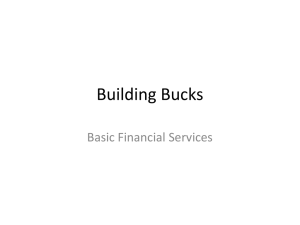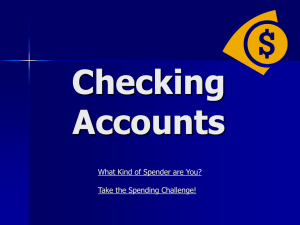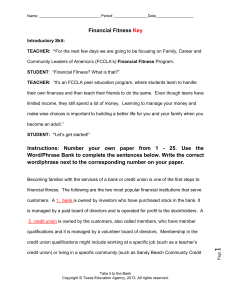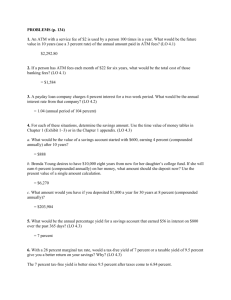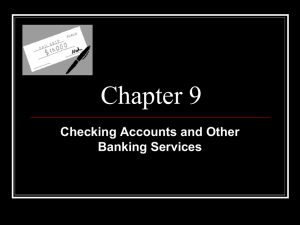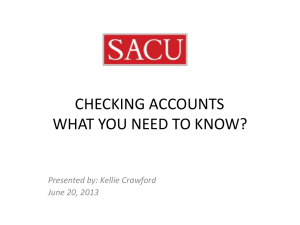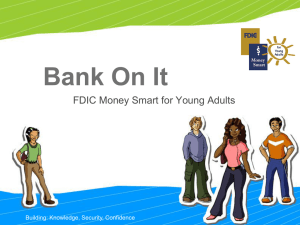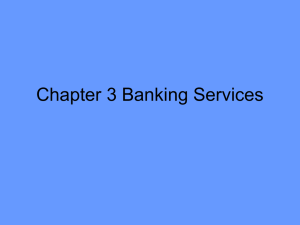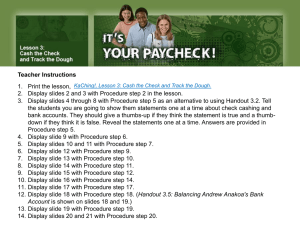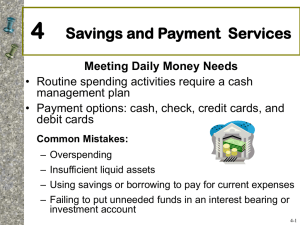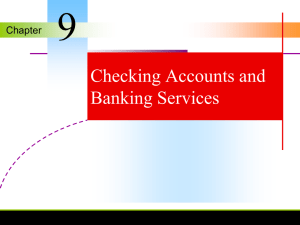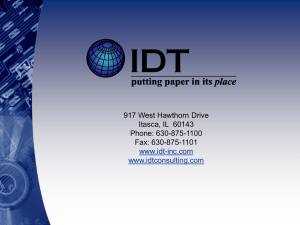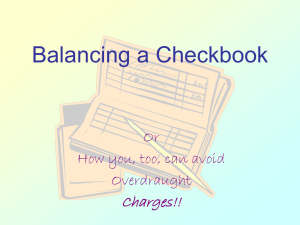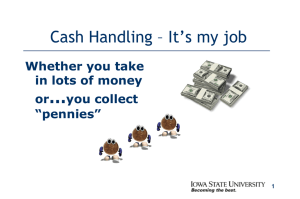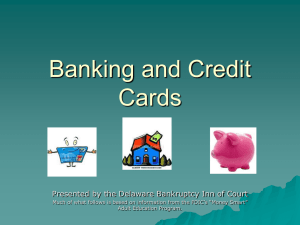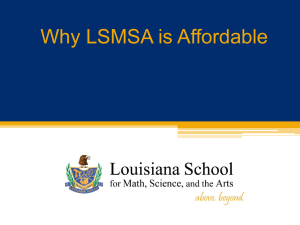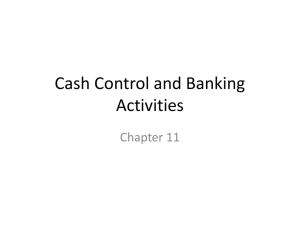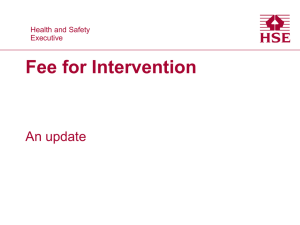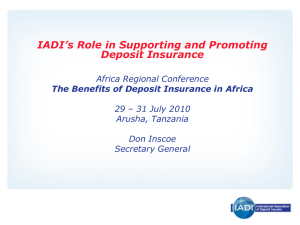Banking and Money Mangemenet PowerPoint
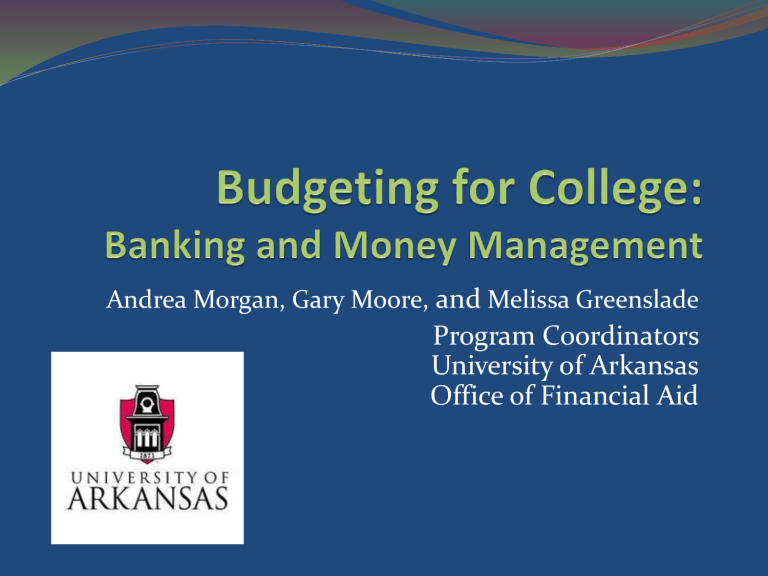
Andrea Morgan, Gary Moore, and Melissa Greenslade
Program Coordinators
University of Arkansas
Office of Financial Aid
Bank or Credit Union?
Bank
“For-Profit” organizations in business to make money for their stockholders
Serve the general public
Deposits federally insured up to $250,000 by the Federal
Deposit Insurance
Corporation (FDIC) www.fdic.gov
Credit Union
“Not-For-Profit” organizations that exist to serve their members
Some require you to be a member of a certain group to join (i.e. teachers, police, etc.)
Many are now open to anyone who wishes to join
Deposits federally insured up to $250,000 by the National
Credit Union Administration
(NCUA) www.ncua.gov
Types of Bank Accounts
Savings Accounts
Checking Accounts
CDs (Certificates of Deposit)
Money Market Accounts
Safe Deposit Boxes
Consider Liquidity— how easily or quickly you can/want to withdraw your money
Savings Accounts
Basic “deposit” account with most banks and credit unions to earn interest on savings
Interest rates are usually about 1-2%
How is interest calculated?
Simple Interest – interest is calculated only on the principal
Compound Interest – interest is calculated on the principal plus any interest already paid
Pros: low risk, high liquidity
Cons: low interest rate
Checking Accounts
Convenient “transactional” account to deposit and withdraw money and write checks to pay for purchases and bills
Usually do not pay any interest
Single vs. Joint Checking Accounts
Single : you are the only person with access to the account
Joint: you share the account and money in the account with one or more persons
Be careful about having joint checking accounts!
Pros: low risk, high liquidity
Cons: low/no interest rate, balance required to avoid fees
Money Market Accounts
Like combined checking and savings accounts
Can write checks (although may be limited each month) and earn higher interest than a typical savings account
Usually require a minimum balance of $10,000 or more and may charge fees if balance drops below a certain level
Pros: better interest rates, high liquidity
Cons: greater initial deposit required, may have limited transfers/withdrawals
Certificates of Deposit (CDs)
Fixed interest rate for a specified term, from three months up to five years or longer
Best suited for those with funds that can remain untouched for longer periods of time
If you withdraw your money before the term ends, you will lose interest and may be charged a penalty fee
Pros: higher interest rates, often insured by the government
Cons: low liquidity
Safe Deposit Boxes
A metal drawer in a bank vault that is rented out on an annual basis as storage for important papers and small items of value
Cost between $15-100 per year
Opening a Bank Account
To open a bank account you will need:
Identification
Photo ID
Social security card
And/or certified copy of birth certificate
Cash or check for deposit
The bank will have you complete paperwork and sign an account agreement and a signature card
ATM and Debit Cards
ATM Cards are linked to your checking and/or savings account and allow you to withdraw money from your account using your bank’s (and other banks’)
Automatic Teller Machines (ATMs).
Debit Cards are upgraded ATM/credit cards. Money spent using your debit card is withdrawn immediately from your checking account and sent straight to the company you are paying.
PIN (Personal Identification Number) is a secret code that only you should know that grants access to the money in your account at ATMs and merchants
Checks
Never have your Social Security Number, Driver’s
License Number, or Phone Number printed on your checks
Many checks are now processed electronically
Writing a Check
1.
2.
3.
4.
5.
6.
Date
Payee Name
Amount in numbers
Amount written in words
Memo (optional)
Payer Signature
Deposit Slips
Available in the back of your checkbook or at the bank, used for making deposits at your bank
Direct Deposit
Automatic deposit of wages into a consumer’s bank account
Convenient and safer than paper check deposits
Banking Fees
Checking Fee – fee for having a checking account open; often based on balances
Some banks offer free checking with direct deposit or certain minimum balances
Minimum Balance Fee – fee for failing to keep a certain minimum balance in your checking or savings account
ATM Fee– fee charged for using another bank’s ATM
NSF Fee – non-sufficient funds (bounced check) – fee for over withdrawing on your account; around $35 per instance
Other Bank Policies and Services
Funds Availability Policy – how long before your deposit is available for you to use
Automatic Withdrawals – bill payments or savings transfers are made automatically; best for fixed payments
Overdraft Protection – bank will cover payment over the amount you have in your bank account
New Regulations require that you opt in to this; it is not automatic
Debit Card purchases will be declined if you are overdrawn
Some banks have a charge for this
Balancing a Checkbook
Make it a habit to record EVERY checking account deposit, payment, or withdrawal in your checking account register (checkbook)
Reconciliation – comparing your checkbook and monthly bank statement to ensure the balances match
Balancing a Checkbook
1.
2.
3.
4.
5.
Check number
Date of Transaction
Title of Transaction
Payment
Deposit
Sample Bank Statement
Internet Banking
Internet-only banks without physical offices
Online branches of brick and mortar banks
Benefits of online banking:
Access to account information at any time
Ability to transfer money easily between accounts
To Bank or Not to Bank?
Other Options?
Must find ways to cash a check.
Check cashing store
Fee ranging from 1.75% to 3% of the check
$300 check, 2% fee = $6 each time. 24$/month
Must find ways to pay bills.
Cashier’s checks or money orders cost money
Immediately withdraw money from an account or have cash available to pay bank or merchant to write a guaranteed check to pay a bill
Fees around $5 each.
Any Questions?
Before you go…
Evaluation Forms
PowerPoint will be posted on our website
Thank You!
Contact Information:
Office of Financial Aid; Andrea, Gary, and Melissa
Campus location: 114 Silas Hunt Hall
Phone: 479-575-3806
Fax: 479-575-7790
E-mail: finaid@uark.edu
Website: http://finaid.uark.edu/
And find us on Facebook at University of Arkansas
Financial Aid!
